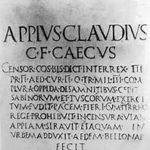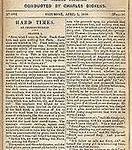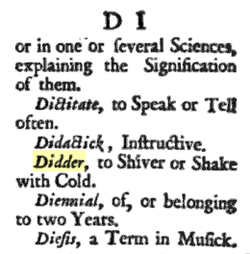“Why does my son have to learn such hard words?”
It is customary to begin a school year with an evening spent with parents. Dads and moms follow their child’s schedule, meeting teachers, hearing about the scholastic year from each instructor.
 In my experience, the evening had a preamble in a large group from the administrator. Afterward, bells would ring signaling change of classrooms just like students would follow.
In my experience, the evening had a preamble in a large group from the administrator. Afterward, bells would ring signaling change of classrooms just like students would follow.
My five-minute period would begin with an overview of what parents could expect and what students would learn. In the freshman class, for instance, my charges were learning how The Bible came to us; what Christians call “canonicity.” We were learning words such as “revelation,” “inspiration,” “preservation” and “canonization” focused on the idea that The Word came directly from God through human authors. Young people were introduced to important theological terms which form the foundation for how we think about Scripture.
 I finished my three-minute overview of the freshman year. Folks offered some pleasant questions and comments.
I finished my three-minute overview of the freshman year. Folks offered some pleasant questions and comments.
“Anyone else?” I asked seeing we had about one minute left before the bell rang.
 “How come my son has to learn such hard words?” His voice was gruff, argumentative, with a tinge of distain. He was a local pastor.
“How come my son has to learn such hard words?” His voice was gruff, argumentative, with a tinge of distain. He was a local pastor.
“Your son is in biology, is that correct?” I responded to a question with a question as I would in class.
“What’s that got to do with my question?” came the amped-up reply.
 “Did you know that in the first week of biology your son has to learn hard words like taxonomy, phylum, endocrine, and deoxyribonucleic acid?” I was guessing, but those words came to mind from my own high school biology class long ago.
“Did you know that in the first week of biology your son has to learn hard words like taxonomy, phylum, endocrine, and deoxyribonucleic acid?” I was guessing, but those words came to mind from my own high school biology class long ago.
“Would you say that these are hard words?” I ended my brief examination.
His mouth opened but no words came out.
 “This is a Christian school,” I had only 15 seconds left before the bell rang. “We believe that students at a Christian school should learn the vocabulary of Christian belief. Vocabulary forms the foundation for knowledge. Knowledge allows interpretation. Interpretation initiates application to all of life.”
“This is a Christian school,” I had only 15 seconds left before the bell rang. “We believe that students at a Christian school should learn the vocabulary of Christian belief. Vocabulary forms the foundation for knowledge. Knowledge allows interpretation. Interpretation initiates application to all of life.”
“Why should students have to learn ‘hard’ biblical words?” I had three seconds left, “Because theology is the queen of the sciences.”
 The bell rang. The parents were all looking at me. No one said a word. No one moved.
The bell rang. The parents were all looking at me. No one said a word. No one moved.
“I look forward to teaching your children this year. Contact me any time with any questions you might have,” I smiled and swept my arm toward the open door. Smiles were returned as parents filed out.
Why should biblical theology be any different than biology, chemistry, or calculus?
 Every subject of study is governed by formal vocabulary. Each discipline depends on rigorous research. All classes are contingent upon definitions, interpretations, and applications which conform to standards of thought.
Every subject of study is governed by formal vocabulary. Each discipline depends on rigorous research. All classes are contingent upon definitions, interpretations, and applications which conform to standards of thought.
My students learned words like aseity (God is independent and self-sufficient), transcendence (God is separate, apart from His creation), immanence (God is close to, cares about His creation), ontology (the study of origins, purpose, meaning), and teleology (the study of ends, hope).
 Most students were surprised—often pleased—that a “Bible” class in a Christian school emphasized change of mind as well as change of heart. I taught them that the Hebraic view of “heart” included what we in The West called the “mind.” Attitudes, knowledge, will, action were woven with each other. To impact thinking meant to impact being, and ultimately, acting. Knowledge is not separate from internal change. Vocabulary establishes meaning. Words matter.
Most students were surprised—often pleased—that a “Bible” class in a Christian school emphasized change of mind as well as change of heart. I taught them that the Hebraic view of “heart” included what we in The West called the “mind.” Attitudes, knowledge, will, action were woven with each other. To impact thinking meant to impact being, and ultimately, acting. Knowledge is not separate from internal change. Vocabulary establishes meaning. Words matter.
 The pastor’s son went on to become a radio and television personality. He now interprets movies from a Christian point of view. His work is syndicated throughout the nation.
The pastor’s son went on to become a radio and television personality. He now interprets movies from a Christian point of view. His work is syndicated throughout the nation.
And sometimes he uses hard words.
Dr. Mark Eckel has taught hard words for over 30 years without apology–and often thanks from students. Mark is president of The Comenius Institute. This essay is one written toward Dr. Eckel’s forthcoming book Up Against the Lockers.


Knowledge without Wisdom has proven itself to be a dangerous thing, and knowledge without responsibility has proven to be even worse. When we care about what we learn, we own our knowledge, and therefore accept the responsibility that comes with having that knowledge. Teaching “hard” words is one of the ways in which we can bring others to own their knowledge. Because “hard” words must be worked for. And knowledge that is worked for is cared about. And knowledge that is cared about is owned, cherished, and taken with responsibility.
Thanks for this excellent post, Dr. Eckel.
Thank you, Dr. Eckel, for using a common scenario experienced by teachers to emphasis the importance of teaching vocabulary. Sometimes it appears as if vocabulary instruction is undervalued by educators and parents. Brain research reveals that the brain makes sense of incoming information by attending to language-based characteristics in the process conceptual development. Vocabulary provides rich interconnected conceptual links between domains of knowledge. Yes! It is crucial that students in all grades are engaged with “hard words” throughout the school experience that includes verbal, written, and visual exchange of ideas.